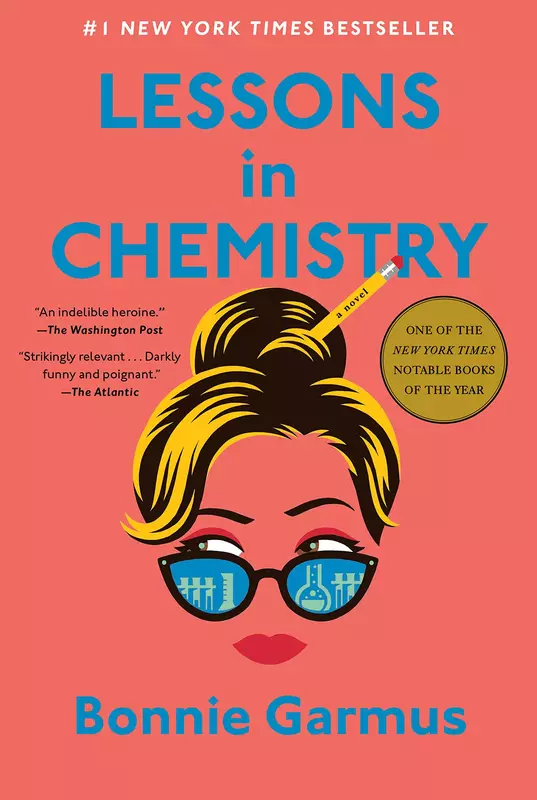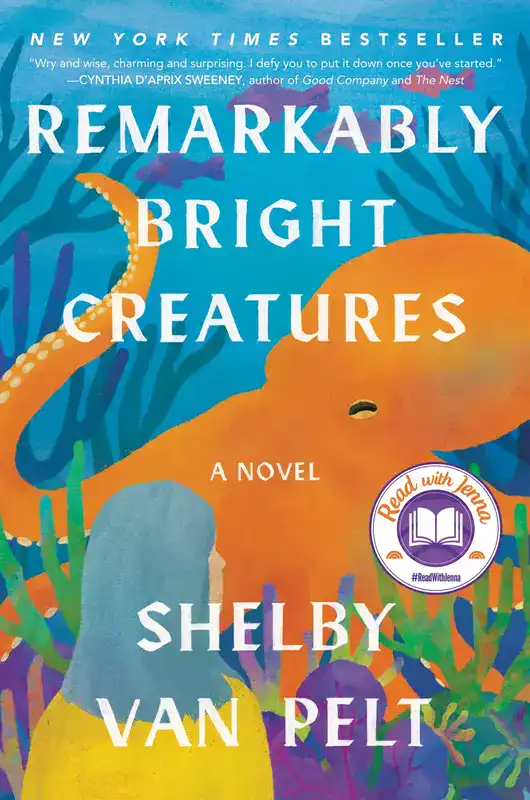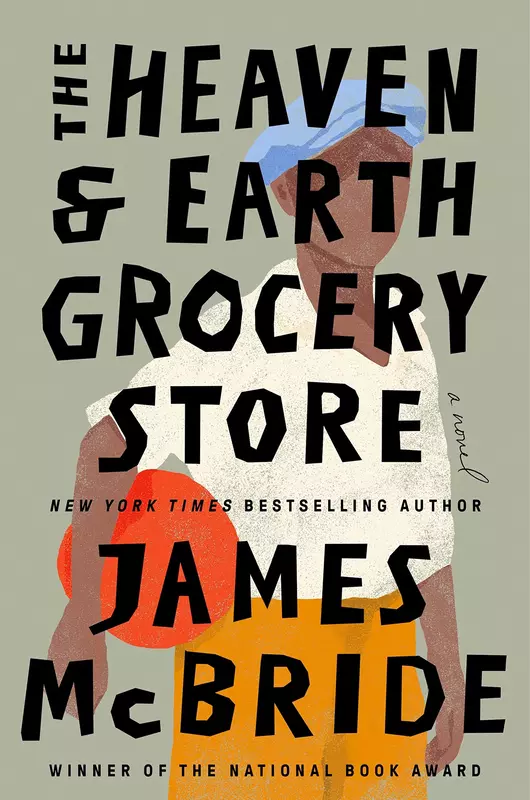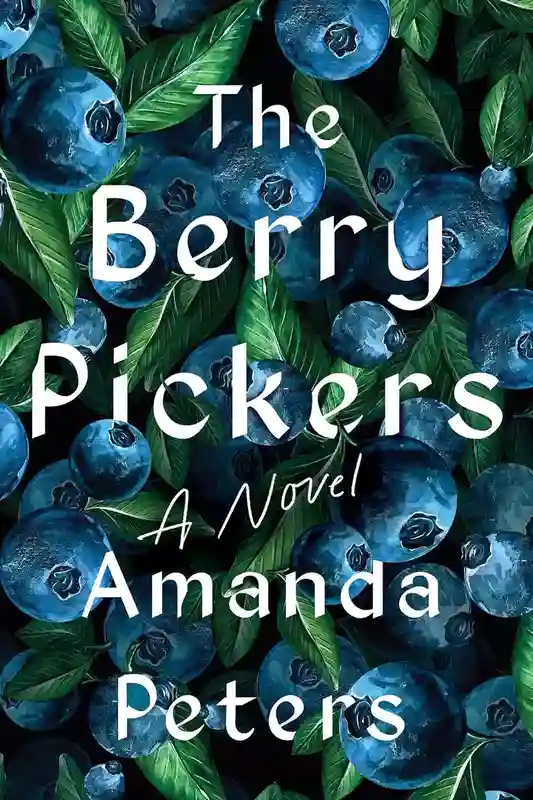This post may contain affiliate links. Read more here.
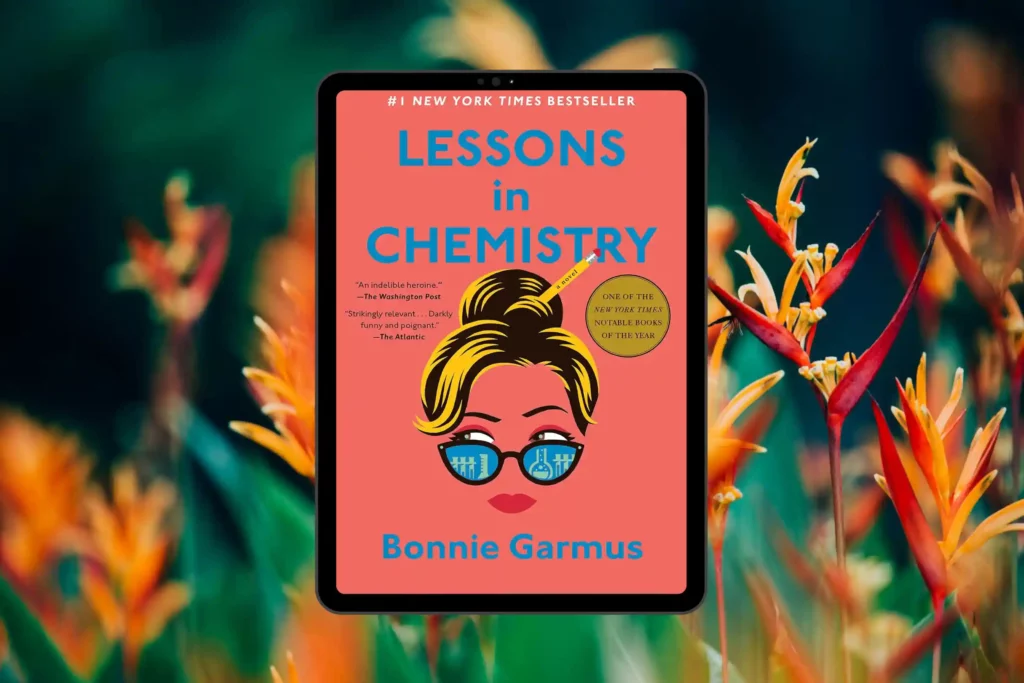
Book club questions for Lessons in Chemistry by Bonnie Garmus explore the themes of gender equality, unconventional career paths, the intersection of science and everyday life, societal expectations, and the transformative power of challenging the status quo.
OMG! What a gift! Thank you Bonnie Garmus, for your brilliant, funny, and educational book. It had me bursting into laughter at times and shedding tears at others. Your work touched me deeply.
If you are thinking of watching the television series, do yourself a favor and read the book first!
What are your thoughts on this novel? ✨
Lessons in Chemistry by Bonnie Garmus
In this blog post you will find the discussion questions for Lessons in Chemistry by Bonnie Garmus.
Check the menu items if you’re looking for a complete summary and character guide of this novel (in a separate post), or if you’ve finished reading and are looking for recommendations for other novels similar to Lessons in Chemistry.
Have an amazing discussion analysis with your book club! ✨
About the Author | Book Club Questions
Similar Novels | Additional Recommendations
About the Story
Lessons in Chemistry follows a woman named Elizabeth Zott, a talented chemist in the 1960s California. Despite working in a male-dominated environment, Elizabeth finds an unexpected connection with Calvin Evans, a brilliant colleague who falls for her intellect. Life takes a turn, and Elizabeth becomes a single mother.
Later, Elizabeth becomes the star of a popular cooking show, “Supper at Six,” where she brings her scientific approach to cooking. Her unconventional methods challenge the norms, not just in the kitchen but also in society.
The novel is laugh-out-loud funny, cleverly observant, and filled with interesting characters, making it a unique and vibrant story.
About the Author
Bonnie Jean Garmus, born on April 18, 1957, in Riverside, California, is an American author and used to work as a copywriter. She is originally from Seattle but has worked in the United States and lived in Switzerland and Colombia.
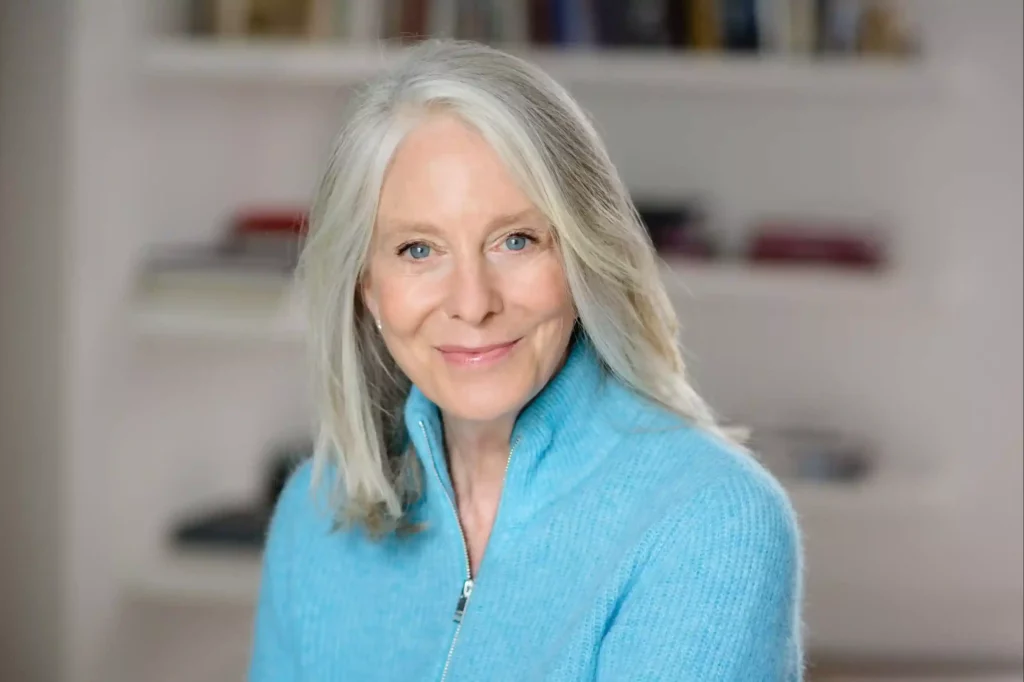
In April 2022, she published her first novel, Lessons in Chemistry, which received positive reviews for its polished, funny, and thought-provoking story. The New York Times praised its entertaining subplots and witty dialogue, and a chemistry professor named Olimpia Mamula Steiner highly recommended it.
By January 2022, Lessons in Chemistry had been sold in 35 territories, and a TV adaptation was in the works at Apple TV+, featuring Brie Larson. The book was also translated into French and shortlisted for the 2023 RSL Christopher Bland Prize.
Bonnie Garmus is married with two daughters and currently resides in London. She has a passion for open water swimming and has a background in competitive rowing.
Book Club Questions for Lessons in Chemistry
Disclaimer: the following discussion questions contain spoilers, so proceed with caution if you haven’t finished the book yet.
- Elizabeth Zott is portrayed as a unique and determined woman in the field of chemistry. How did the author depict the challenges Elizabeth faced as a woman in STEM during the 1960s? Discuss her character’s strengths and weaknesses.
- In the early stages of Elizabeth’s pregnancy, Dr. Mason expresses surprise at her continued rowing. How does this decision reflect Elizabeth’s character and her commitment to her passions? In what ways does her dedication to rowing mirror her resilience in the face of adversity?
- Calvin reveals to Elizabeth that he believes a wealthy man is his biological father. How does this revelation impact their relationship, and in what ways does it influence Calvin’s perception of his own identity?
- Walter initially proposes the cooking show as a way to keep his job, but over time, he becomes a supportive friend and ally to Elizabeth. Explore Walter’s transformation and the pivotal moments that solidify his friendship with Elizabeth.
- The novel is described as “the Catch-22 of early feminism.” In what ways does Elizabeth Zott challenge societal norms, especially regarding women’s roles? How does her journey reflect the broader issues of gender equality in the 1960s?
- Harriet starts as Elizabeth’s neighbor, providing support during difficult times. How does Harriet’s character evolve, especially in her relationship with Walter, and what role does she play in Elizabeth’s journey?
- Explore the tension and resolution surrounding the bomb incident on the cooking show. How does Six-Thirty’s role in detecting the threat contribute to the theme of loyalty and protection in the story?
- Discuss Elizabeth’s feelings of betrayal after Life magazine publishes a misleading article about her. How does this event impact her mental and emotional state, and in what ways does it shape her decisions moving forward?
- Examine Frask’s character development from being a source of conflict to a catalyst for change. How does her act of sending a letter to Life magazine contribute to Elizabeth’s redemption in the eyes of the public?
- Elizabeth’s career takes unexpected turns, from groundbreaking research to hosting a cooking show. How does her professional journey impact her personal life? Discuss the choices she makes and the consequences she faces.
- The novel boasts a “dazzling cast of supporting characters.” Identify key supporting characters and discuss their roles in Elizabeth’s life. How do they contribute to the overall narrative?
- The book incorporates scientific elements, particularly in Elizabeth’s unconventional approach to cooking. How does the author balance scientific concepts with storytelling? Did you find the scientific aspects engaging or challenging?
- For those who have watched the Apple TV+ series, compare and contrast it with the book. How well do you think the adaptation captures the essence of the novel and its themes?
- The novel is described as “laugh-out-loud funny” and “witty.” Explore moments of humor in the story. How does the author use humor to address serious topics and keep the narrative engaging?
- The book is inspired by the experiences of women in science during the 1960s. Discuss how the novel aligns with or diverges from real-life stories of women in STEM during that era.
- Supper at Six becomes a platform for Elizabeth to empower women. Discuss the significance of her cooking show in challenging societal norms and promoting change. How does she use this unconventional platform to convey her message?
- Some reviews mention the ending feeling like a “drop off a cliff.” Without revealing spoilers, share your thoughts on the conclusion. Did the ending feel satisfying or leave you with unanswered questions?
- The novel explores themes of resilience and empowerment. In what ways does Elizabeth embody these themes? Discuss specific instances where she overcomes challenges and empowers herself and others.
- Considering the themes of gender equality and societal expectations, discuss the relevance of Lessons in Chemistry in today’s context. How much progress has been made, and what challenges still persist?
- What is the significance of Elizabeth always wearing a pencil in her hair? Is it a symbol of strength or a weapon?
- Elizabeth challenges societal limits and encourages others to do the same. How do characters in the book rise to this challenge, and in what ways have you or others been restricted by societal norms?
- Six-Thirty, the pet, highlights human communication issues. What does “smart” mean to you, and have you ever thought about the lessons your pet might be trying to teach you?
- The book explores faith beyond religious doctrine. What role does religion play in the story? What is a Humanist? How does psychology explain the human desire to believe in something greater, and why do characters in the book emphasize personal responsibility?
- Male characters in the book sympathize with Elizabeth but struggle to stand up for women and minorities in the workplace. Why do well-intentioned people find it challenging to speak up, and what are the consequences of remaining silent?
- Despite facing challenges, Elizabeth remains resilient. What fuels her resilience, and why, even after achieving stardom, does she feel more miserable than ever?
- Harriet Sloane is an avid magazine reader. How do magazines and media shape culture, and what did Harriet mean by advising Elizabeth to “recommit”? Is there a dream of yours that you wish to recommit to?
- Friendship and family are central themes. Can friendships sometimes provide a better sense of family than biological connections? How do you define family?
- Mad’s family tree combines whimsy with truth. If humans are almost exactly the same, why do we treat each other so differently?
- Today, do you believe that a man experiencing a day as a woman in America might face significant challenges, as suggested in the Life Magazine reporter’s conversation with the audience members? Is there still a need for change in gender perceptions?
- Elizabeth and Calvin faced jealousy and resentment from their colleagues at Hastings Research Institute. Why do you think their co-workers were so envious or resistant to their success, creating a Mean Girls-like atmosphere in the workplace?
- Elizabeth and Calvin had significant gaps in what they shared with each other, yet their relationship remained remarkably close. Can a relationship thrive with such gaps, and have you experienced something similar in your own relationships?
- Elizabeth’s use of chemical calculations for cooking, such as determining the water molecules in biscuit batter, is unique. Have you ever used a scientific approach in your cooking, and do you consider your cooking more of a science or an art?
- The book addresses sexism, unfair pay, sexual assault, and dismissive attitudes toward women’s intellect, reflecting aspects of the 1950s. How do you see these issues persisting in today’s culture, and what steps do you think can be taken to address them?
- Elizabeth faces constant challenges in a male-dominated field. Have you ever encountered a similar situation in your career, and could you relate to Elizabeth’s experiences?
- How did Elizabeth’s unconventional upbringing and strained relationship with her parents influence her approach to adult relationships?
- The supporting cast, including neighbors like Harriet and producer Walter, plays a significant role. Who was your favorite supporting character, and why?
- Discuss Madeline’s exceptional intelligence, such as her reading abilities and intuitive understanding of people. How does Madeline’s intelligence contribute to the dynamics within the Zott family, and how does it influence Elizabeth’s choices as a mother?
- Analyze the scenes where Elizabeth challenges societal expectations on her cooking show. How do her actions subvert traditional gender roles, and what impact does this have on the show’s popularity?
- Explore the significance of Avery Parker’s revelation as Calvin’s biological mother. How does this revelation tie together loose ends in the narrative, and in what ways does it contribute to Elizabeth’s understanding of Calvin’s past?
- Analyze the closing scenes where Elizabeth returns to her abiogenesis research. How does this resolution tie back to the novel’s overarching themes of scientific passion, justice, and personal growth?
- Discuss your overall impressions of the ending and speculate on what might happen next for Elizabeth.
- Did you feel like you gained any insights or lessons from reading the novel? Are there specific passages or scenes that stood out to you?
- Is there anything else from the book that you would like to discuss or highlight as a favorite moment?
Additional Recommendations
Hope you enjoyed the book club discussion questions and reading guide for Lessons in Chemistry by Bonnie Garmus.
Here are some more of my book club recommendations related to this book:
Remarkably Bright Creatures by Shelby Van Pelt
For fans of A Man Called Ove, a charming, witty and compulsively readable exploration of friendship, reckoning, and hope that traces a widow’s unlikely connection with a giant Pacific octopus
After Tova Sullivan’s husband died, she began working the night shift at the Sowell Bay Aquarium, mopping floors and tidying up. Keeping busy has always helped her cope, which she’s been doing since her eighteen-year-old son, Erik, mysteriously vanished on a boat in Puget Sound over thirty years ago.
Tova becomes acquainted with curmudgeonly Marcellus, a giant Pacific octopus living at the aquarium. Marcellus knows more than anyone can imagine but wouldn’t dream of lifting one of his eight arms for his human captors—until he forms a remarkable friendship with Tova.
Ever the detective, Marcellus deduces what happened the night Tova’s son disappeared. And now Marcellus must use every trick his old invertebrate body can muster to unearth the truth for her before it’s too late.
Shelby Van Pelt’s debut novel is a gentle reminder that sometimes taking a hard look at the past can help uncover a future that once felt impossible.
The Heaven & Earth Grocery Store by James McBride
From James McBride, author of the bestselling Oprah’s Book Club pick Deacon King Kong and the National Book Award–winning The Good Lord Bird, a novel about small-town secrets and the people who keep them
In 1972, when workers in Pottstown, Pennsylvania, were digging the foundations for a new development, the last thing they expected to find was a skeleton at the bottom of a well. Who the skeleton was and how it got there were two of the long-held secrets kept by the residents of Chicken Hill, the dilapidated neighborhood where immigrant Jews and African Americans lived side by side and shared ambitions and sorrows.
Chicken Hill was where Moshe and Chona Ludlow lived when Moshe integrated his theater and where Chona ran the Heaven & Earth Grocery Store. When the state came looking for a deaf boy to institutionalize him, it was Chona and Nate Timblin, the Black janitor at Moshe’s theater and the unofficial leader of the Black community on Chicken Hill, who worked together to keep the boy safe.
As these characters’ stories overlap and deepen, it becomes clear how much the people who live on the margins of white, Christian America struggle and what they must do to survive. When the truth is finally revealed about what happened on Chicken Hill and the part the town’s white establishment played in it, McBride shows us that even in dark times, it is love and community—heaven and earth—that sustain us.
The Berry Pickers by Amanda Peters
A four-year-old Mi’kmaq girl goes missing from the blueberry fields of Maine, sparking a mystery that will haunt the survivors, unravel a family, and remain unsolved for nearly fifty years
July 1962. A Mi’kmaq family from Nova Scotia arrives in Maine to pick blueberries for the summer. Weeks later, four-year-old Ruthie, the family’s youngest child, vanishes. She is last seen by her six-year-old brother, Joe, sitting on a favorite rock at the edge of a berry field. Joe will remain distraught by his sister’s disappearance for years to come.
In Maine, a young girl named Norma grows up as the only child of an affluent family. Her father is emotionally distant, her mother frustratingly overprotective. Norma is often troubled by recurring dreams and visions that seem more like memories than imagination. As she grows older, Norma slowly comes to realize there is something her parents aren’t telling her. Unwilling to abandon her intuition, she will spend decades trying to uncover this family secret.
For readers of The Vanishing Half and Woman of Light, this showstopping debut by a vibrant new voice in fiction is a riveting novel about the search for truth, the shadow of trauma, and the persistence of love across time.
Printable PDF
Feel free to distribute these discussion questions to your book club members before your meeting. Simply click the link below to download and print the PDF file.
Happy reading! ❤️
